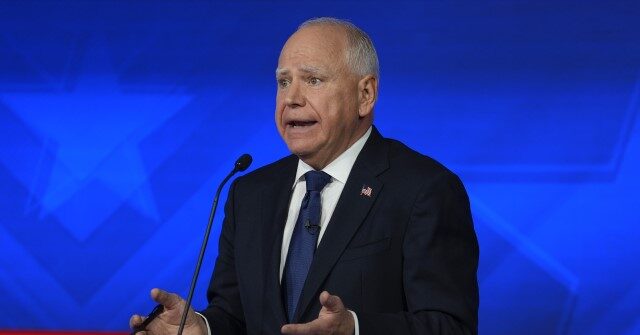During a recent interview with WGAL News 8, Minnesota Governor and 2024 Democratic vice presidential candidate Tim Walz defended the current administration’s economic policies against criticisms touting the outcomes of the Trump administration. Walz confronted the common narrative that former President Trump’s tenure was characterized by a stronger economy and beneficial tax cuts by highlighting the negative repercussions of Trump’s time in office. He emphasized that Trump left the nation with 10 million people unemployed and 9 million jobs lost, particularly exacerbated by the onset of the COVID-19 pandemic. Walz asserted that many voters do not wish to return to the dire circumstances suffered during Trump’s presidency, where tens of thousands of Americans lost their lives and businesses were forced to shut down.
WGAL News 8 Reporter Barbara Barr pointed out that polls indicate many Americans, including those in Pennsylvania, believe the economy performed better under Trump, attributing this perception to his tax cuts. In his response, Walz reiterated his argument that the economic benefits claimed during Trump’s administration came at a great cost to public health and employment. He insisted that the illusion of a flourishing economy was shattered by the pandemic’s impact and by Trump’s handling of the crisis, which Walz described as a “botched” recovery process. Furthermore, he expressed criticism of Trump’s economic strategies, including his policies towards China and tariff implementation, suggesting these contributed to economic instability.
Walz articulated a clear distinction between the Democratic vision and Trump’s approach, arguing that the past should not dictate the future. He argued that a focus on the future hinges on creating an “opportunity economy,” one where all Americans can share in prosperity. In contrast to Trump’s fixation on what he deemed past successes, Walz positioned the Democratic agenda as a progressive vision aiming to foster growth and opportunities moving forward. He emphasized the importance of labor, underscoring that union jobs provide individuals with a pathway to the middle class that enables them not just to survive but to thrive in their economic pursuits.
Moreover, Walz emphasized the role of unions in advancing workers’ rights and securing fair wages. He portrayed Trump as dismissive of labor movements, which are vital for empowering workers in negotiating rightful compensation and benefits. In highlighting the strength of collective bargaining, Walz argued that good union jobs can substantially uplift communities, directly contradicting Trump’s anti-union stance. This aspect of Walz’s argument aims to resonate particularly with voters in Pennsylvania, a critical battleground state with a strong labor history, suggesting that an investment in worker rights aligns with the broader objective of economic revitalization.
The interview highlighted the stark divide in economic philosophies between the two parties, where Republicans often emphasize individual success facilitated by tax cuts, while Democrats advocate for a more collective approach to economic health through unionization and worker empowerment. Walz’s narrative seeks to reframe the discussion on fiscal policies, urging voters to consider the long-term impacts of governmental decisions on everyday lives, particularly through the lens of health and employment stability during the tumultuous pandemic period. He challenges the retrospective glorification of Trump’s economic policies by anchoring the conversation in the realities faced by American families in recent years.
In conclusion, Walz’s statements reflect a broader Democratic challenge to the Trump legacy, tapping into the fears and experiences of the American public during the COVID-19 crisis. By focusing on the present and future potential for economic growth through union support and collective opportunity, he positions himself and the Democratic party as not just an alternative, but as a necessary evolution from the past presidency. Emphasizing jobs, health, and a commitment to rebuilding amidst recovery efforts, Walz encapsulates his party’s vision as one aimed at inclusivity and resilience against the backdrop of past failures.

